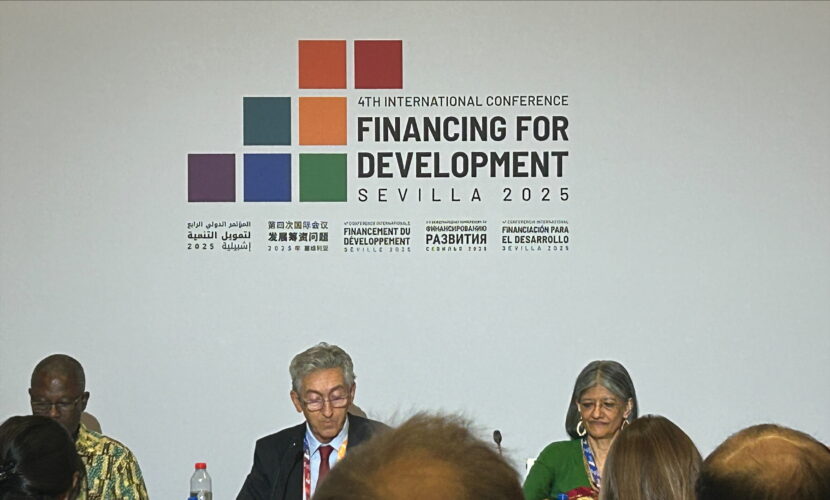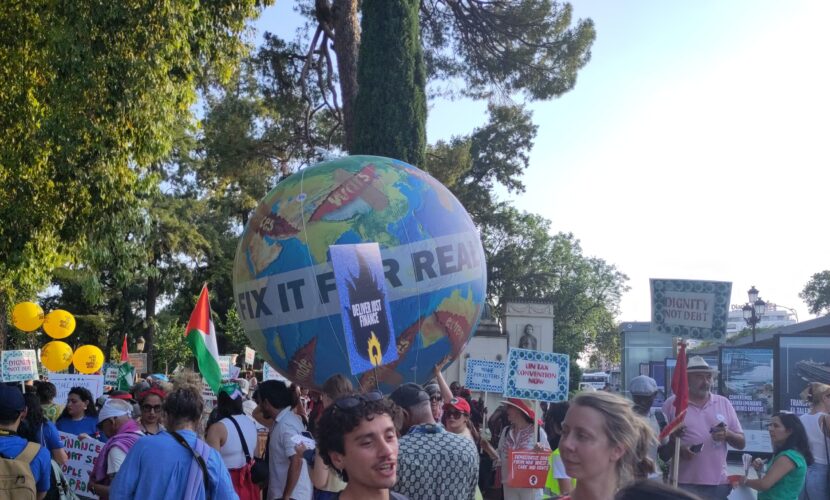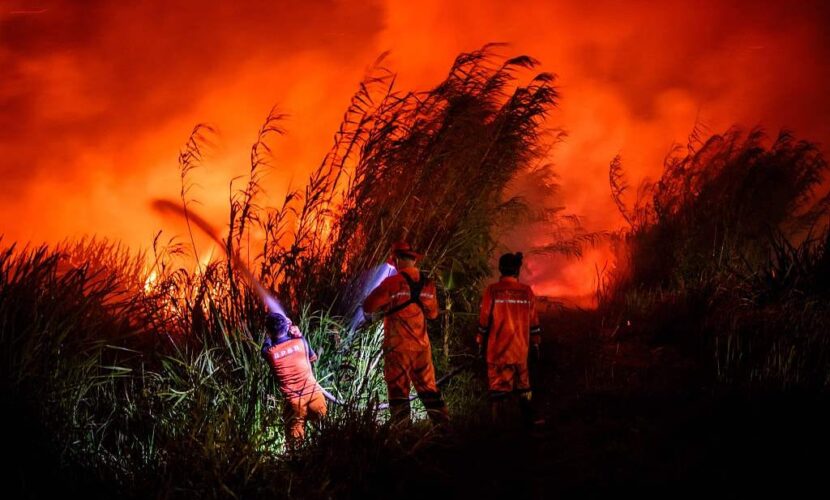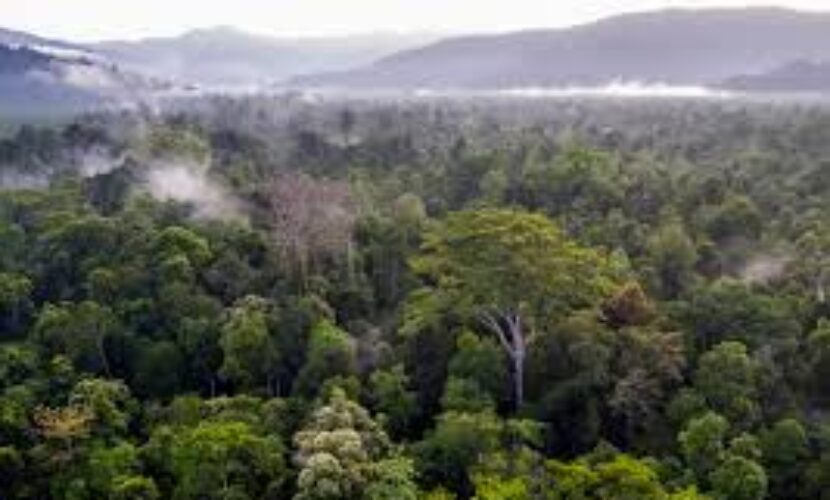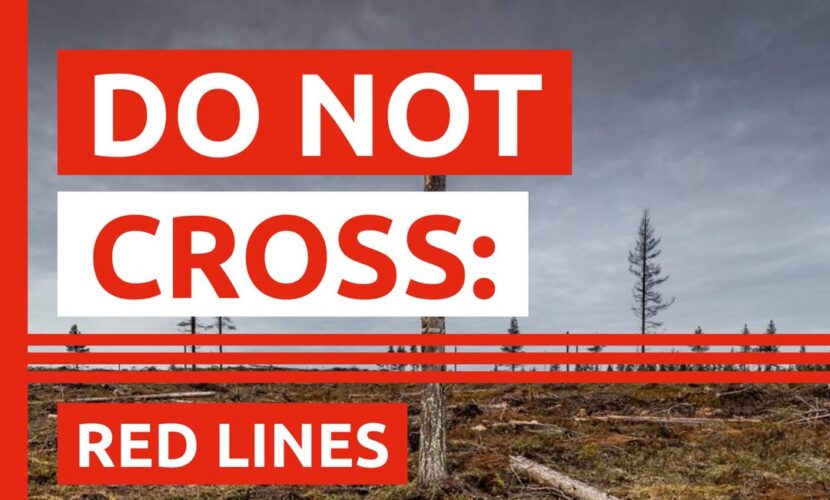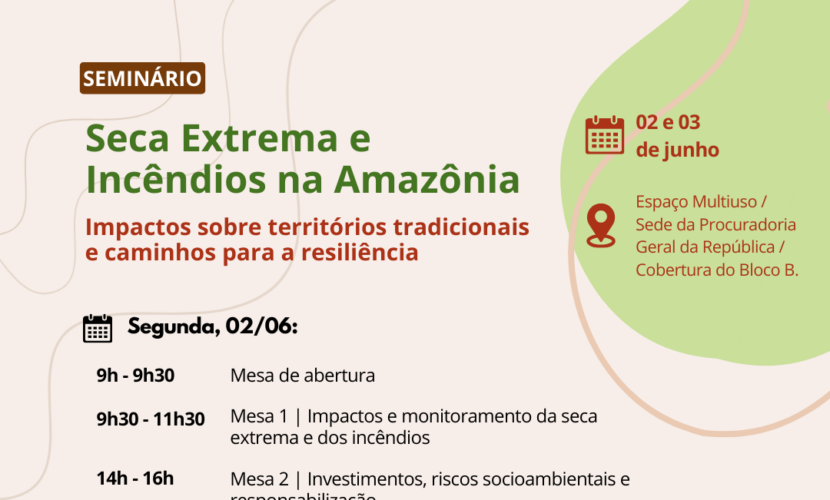News
Banking on False Promises: The Risks of Overreliance on Flawed Certification Schemes
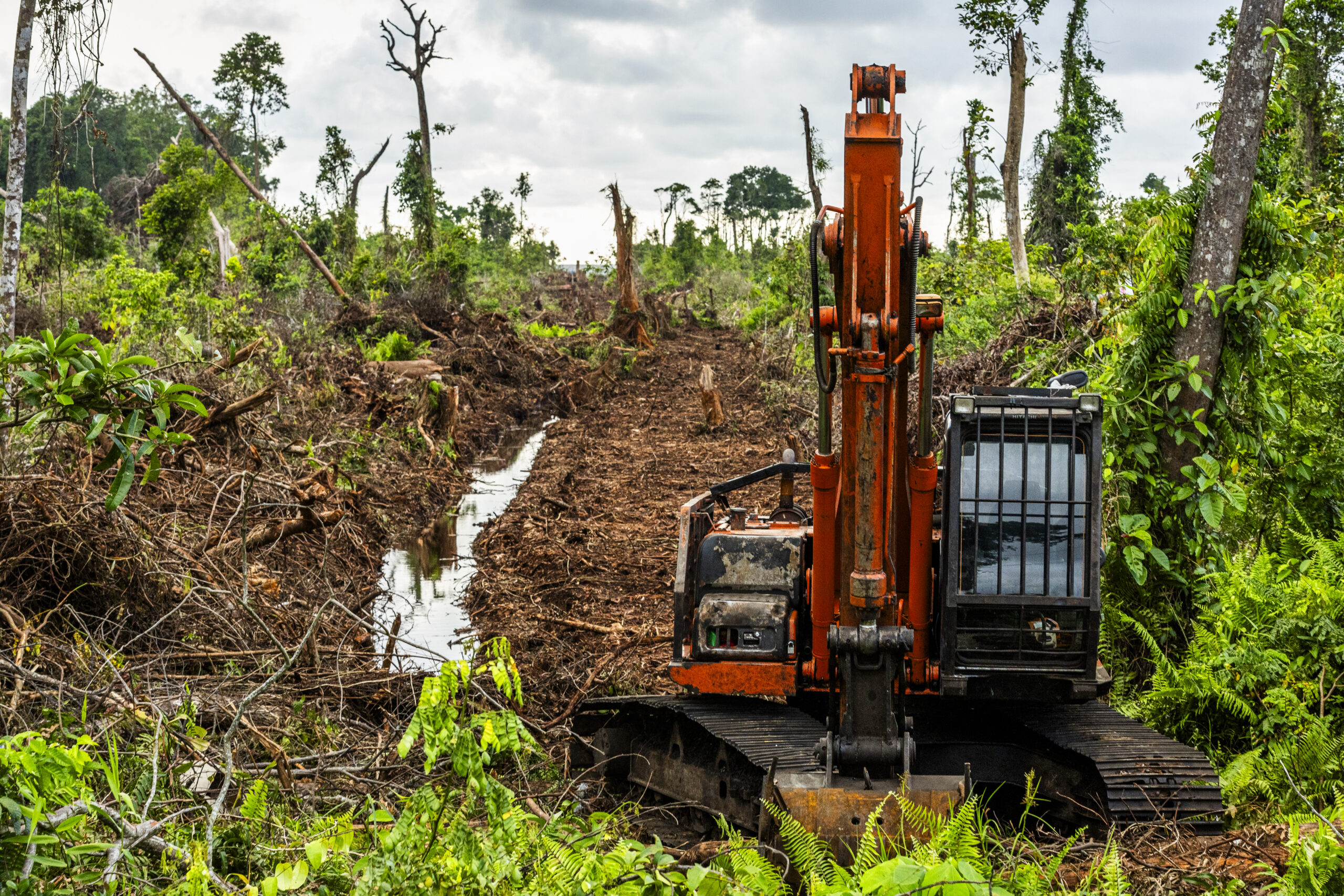
Amid global efforts to combat deforestation and protect human rights, certification schemes like the Forest Stewardship Council (FSC) and the Roundtable on Sustainable Palm Oil (RSPO) have been promoted as solutions to ensure sustainable practices. However, these schemes have major flaws that limit their effectiveness in independently verifying deforestation-free and responsibly produced commodities.1
This case study reveals how companies exploit FSC and RSPO certifications to greenwash harmful activities, demonstrating that financial institutions cannot rely on these schemes to mitigate their exposure to deforestation, and other environmental and social risks. The 2023 Forests & Finance policy assessment found that many financiers with no-deforestation policies relied solely on FSC and RSPO certifications for compliance, ignoring the schemes’ limitations.
Major Flaws in Certification Schemes
- Misalignment with Policies and Regulations: Certification standards do not fully align with No Deforestation, No Peatland and No Exploitation (NDPE) policies2 or comply with the EU Deforestation Regulation (EUDR) requirements.3
- Leniency Toward Non-Compliant Companies: Companies can gain and/or retain certifications despite violating standards, undermining the credibility of these schemes.
- Inadequate monitoring and verification: There is insufficient independent verification of compliance, with conflicts of interests in auditing processes.
- Limited traceability and transparency: Certification relies on mixed-source supply chains and lacks transparency in audit reports, especially concerning non-compliance.
- Conflicts of interest: The schemes are financially dependent on the companies they certify, leading to biased governance and oversight.
Many organizations have long warned that certification schemes are flawed and fail to meet regulatory standards or ensure deforestation-free, responsibly produced commodities.4 A major issue is that these schemes allow companies to retain certification despite evidence of non-compliance, rather than placing the burden of proof on companies to show deforestation-free supply chains.5 Additionally, certification systems fail to hold their members accountable across all operations under the control of their corporate group, and do not address the proliferation of deforestation through members’ ‘shadow companies’.6
Examples of RSPO weaknesses
After over a decade of controversies, the Roundtable on Sustainable Palm Oil (RSPO) revised its standard in 2018 to align with best practice No Deforestation, No Peatland and No Exploitation (NDPE) requirements.7 A key improvement was prohibiting the certification of oil palm plantations grown on lands deforested since November 2018 and requiring the implementation of the High Carbon Stock Approach to protect natural forests.8 However, in 2024, the RSPO is proposing, to its members, to weaken these standards, removing the requirement for members to implement the High Carbon Stock Approach before development. This would effectively let companies set their own deforestation standards.
The RSPO complaint mechanism has been criticized for its protracted process and bias towards companies, often failing to deliver justice or meaningful remedies. 9 It allows companies to retain certification despite substantial evidence of non-compliance.10 Recent changes mean land-grabbing cases are no longer accepted if Indigenous lands were taken without consent before 2004. These cases illustrate that calls from civil society organizations for reforms to the RSPO’s assurance systems have been ignored, rendering the complaints mechanism increasingly ineffective.11
- First Resources Ltd and the Fangiono Group: Indonesia
Despite committing to No Deforestation in 2015, palm oil producer First Resources (SGX:EB5), controlled by the Fangiono family, has been implicated in significant deforestation through shadow companies also controlled by the Fangionos.12 A recent investigation alleges that these companies have cleared 89,000 hectares of rainforest for palm oil since joining the RSPO in 2008.13 First Resources has retained its RSPO certification, despite evidence of violations including allegations on the use of shadow companies in 2018, a 2021 RSPO complaint, and ongoing investigations.14 A number of prominent brands have suspended business with First Resources based on these allegations.15 First Resources has denied operating shadow companies but confirmed that one of the shadow companies exposed for deforestation is a supplier. 16
First Resource received US$ 150 million in credit in 2021 from DBS, Maybank and SMBC Group which all have NDPE requirements for palm oil clients and use RSPO certification as a proxy for NDPE compliance.
- Socfin – Bolloré: West Africa
Despite numerous RSPO complaints and documented human rights abuses on its plantations in West Africa, Socfin, controlled by Bolloré, continues to hold RSPO certification.17 Major investors, like the Norwegian Government Pension Fund and the Swiss Association for Responsible Investments have excluded Bolloré due to its failure to address land grabbing, environmental damage and human rights violations.18 Even Socfin’s own investigations, requested by clients, have reached similar conclusions of harmful practices, and yet Socfin’s RSPO certification remains intact.19
Bolloré’s palm oil operations were financed most recently, in 2021-2022, by banks including United Overseas Bank, Crédit Agricole, and BNP Paribas, all of which use RSPO certification as part of their No Deforestation policy commitments. Other creditors in this period, such as Zenith Bank and Société Générale, were not assessed or only made general commitments like Groupe BPCE. Investors also held US$ 4.5 mln in bonds and shares as of July 2024. These included US-based Affiliated Managers Group, Vanguard and Blackrock, and the Norwegian Government Pension Fund.
- Royal Golden Eagle: Indonesia
Investigations have revealed extensive deforestation and rights violations across the Royal Golden Eagle (RGE) group, including in RGE’s palm oil subsidiaries, Apical and Asian Agri, in violation of their 2015 No Deforestation pledge.20 However, they have retained their certification, allowing continued access to global markets. Apical has been repeatedly exposed for sourcing palm oil from suppliers involved in deforestation and illegal palm oil production within the Leuser Ecosystem.21 Despite this non-compliance, Apical continues to sell RSPO certified palm oil to global markets via the Mass Balance Supply chains which allows the mixing of certified and non-certified sources.
Recent analysis shows that over 1,474 hectares of forests have been cleared inside Asian Agri’s palm oil concessions since 2015, with deforestation increasing since 2019.22 Under the EUDR, palm oil products produced on the land cleared after 2020 would be disqualified from entering the EU market. Both groups have retained their RSPO certification.
RGE has denied deforestation in Asian Agri’s operations.23 Asian Agri claimed the deforestation occurred outside its concession but declined to share data, citing Indonesian law.24 Apical initially denied sourcing illegal palm oil25 but later suspended the broker after identifying supply chain risks.26
The largest ten creditors of RGE’s palm oil operations provided US$ 1.84 billion in loans and underwriting in 2021 and 2024. Among these were MUFG, First Abu Dhabi Bank, E.SUN Financial each providing US$ 286 mln. Based on Forests & Finance 2023 assessment, MUFG’s No Deforestation policy relied upon RSPO certification for implementation.
- Sinar Mas Group: Liberia
Golden Veroleum Liberia (GVL), controlled by Golden Agri Resources (GAR) of the Sinar Mas Group, has violated No Deforestation requirements and international human rights norms.27 This includes failing to respect Indigenous communities rights to give or withhold their Free, Prior and Informed Consent (FPIC) to developments on their lands, deforestation, environmental degradation, and biodiversity loss.28 Since starting operations in Liberia, GVL has been accused of flawed FPIC processes and causing protracted land conflicts. An RSPO complaint, ongoing since 2012, was recently closed despite GVL’s failure to restore High Conservation Value areas that were cleared or address community allegations of land grabbing and other abuses.29 Despite these violations, GVL and GAR remain RSPO members, with GAR retaining certification.
GAR and GVL acknowledged the deforestation in their operations in Liberia in 2021.30GAR quit the High Carbon Stock Approach (HCSA) in 2023 without implementing their recommendations for remediation issued in 2021.31 In 2018, GVL said they would voluntarily suspend membership of the RSPO in response to a RSPO complaint panel decision that included stop work orders.32
SMG was a major recipient of both forest-risk credit and investment securing US$ 5.6 bln (2018-2024 June) and US$ 582 mln (July 2024) respectively. Its most recent creditors include Bank Negara Indonesia, Bank Panin, MUFG, Maybank and CIMB. All of these have No Deforestation policies which reference RSPO certification.
Examples of FSC Weaknesses
Sinar Mas Group (SMG) and Royal Golden Eagle (RGE), two of the world’s largest recipients of forest-risk finance, dominate Indonesia’s palm oil and pulp industries. Both companies lost their FSC certifications due to large-scale deforestation (SMG in 200733 and RGE in 201334). Since then, they have aggressively lobbied to weaken FSC’s standards.35 In 2022, their efforts succeeded when the FSC controversially allowed certification for industrial timber plantations in Indonesia on lands cleared between 1994 and 2020.36
- Sinar Mas Group
SMG’s pulp division, Asia Pulp & Paper (APP), began an FSC remedy process in May 2024 which aims to address past harms, enabling APP to regain certification. These harms included over 100 conflicts with local and Indigenous communities through SMG-controlled companies.37 So far, the remedy process has been criticized for excluding several companies and failing to cover the full scope of APP’s corporate group.38 APP’s flawed policies, particularly around Free, Prior, and Informed Consent (FPIC), and a poor track record in conflict resolution further undermine the credibility of this process.39 For example, a well-documented conflict with the Sakato Jaya Farmers Group in Indonesia’s Jambi province remains unresolved after three years of mediation.40
The FSC has also failed to conduct a credible investigation into evidence that Paper Excellence (PE), a major FSC-certified Canadian forestry company, is controlled by the same corporate group as Asia Pulp & Paper (APP) and Sinar Mas Group (SMG).41 FSC policy should prohibit any company within the same corporate group as a disassociated entity from retaining certification.42 Despite a 2021 FSC review finding no link, subsequent reports strongly suggest common control.43 PE has denied there are ownership or control links with APP or SMG.44
Conflicts of interest have further compromised FSC’s integrity: PE, through its subsidiary Resolute Forest Products, holds a seat on the FSC Canada Board,45 and McMillan LLP, legal advisors to PE, was appointed by the FSC to conduct a further review of ownership links in 2024 despite its clear conflicts of interest.46
SMG’s pulp and paper creditors provided US$ 25.3 bln (2018-2024 June) and all of the largest five were Indonesian banks: Bank Rakyat Indonesia, Bank Mandiri, Bank Central Asia and Bank Negara Indonesia. None of these banks have a No Deforestation policy for the pulp and paper sector, except for Bank Central Asia which has a very weak commitment. Investors held US$ 271 mln in bonds and shares in SMG as of July 2024. The largest were US asset managers Vanguard, BlackRock, and Dimensional Fund Advisors.
- Royal Golden Eagle
RGE, controlled by the Tanoto family, is linked to extensive deforestation despite its 2015 No Deforestation commitment, repeatedly missing targets and extending deadlines.47 Its pulp division, Asia Pacific Resources International Holdings Ltd. (APRIL), withdrew from FSC certification to avoid scrutiny over deforestation allegations.48 In 2023, APRIL began a remedy process to regain FSC certification in 2023,49 but RGE shadow companies continue to be major deforesters in Indonesia.50
For example, PT Mayawana Persada (Mayawana) cleared 33,000 hectares including peatlands since 2021, causing conflicts with the Indigenous Dayak community and threatening endangered species.51 Investigations uncovered RGE’s hidden ownership of Mayawana dating back to late 2022, coinciding with the company’s increased deforestation.52 RGE has denied any ownership links or forms of control to Mayawana.53
Similarly, PT Toba Pulp Lestari Tbk (PT TPL), which is over 90% owned by the Tanoto family through offshore entities, has been involved in rights violations against 23 Indigenous Batak communities resisting development on their lands.54 Despite continuing deforestation in PT TPL concessions after the 2020 FSC cut-off, it is still under consideration to gain certification.55 PT TPL has refuted allegations of deforestation.56
RGE received US$ 7.6 bln in credit (2018-2024 June) with the Chinese Bank of China, CITIC and China Minsheng in the top five, alongside Brazilian Bradesco and Japanese MUFG. Only Bank of China had some commitments that applied to the pulp and paper sector, however these were weak.
Need for Stronger Due Diligence and Policies
To avoid facilitating environmental and social harms, financial institutions must go beyond relying on flawed certification schemes.57 They should adopt NDPE-aligned policies, require corporate group-level compliance from clients, and implement robust monitoring, due diligence and independent verification processes. Establishing a grievance mechanism aligned with the United Nations Guiding Principles (UNGP) would ensure non-compliance is reported and addressed.
With the European Union Deforestation Regulation (EUDR) coming into force in December 2024, financial institutions should align their policies with emerging regulations that apply to their clients. The EUDR requires full traceability and compliance with local laws for forest-risk commodities entering the EU market to ensure they are deforestation-free. A recent study found that FSC and RSPO, among other certification schemes, fail to meet EUDR standards, underscoring the need for more stringent oversight.58
Conclusion
Certification schemes like FSC and RSPO are fundamentally flawed and cannot be solely relied upon by financial institutions to address their role in driving deforestation and human rights violations. As evidenced by the actions of companies like First Resources, Socfin, Royal Golden Eagle, and others, these certifications often serve as a facade for harmful practices. Financial institutions must adopt NDPE policies and robust due diligence and independent verification measures, beyond reliance on these certifications, to prevent contributing to environmental destruction and social harm.59 While aligning with regulations like the EUDR is necessary, it is not enough. The European Commission must complete its impact assessment as per the EUDR review clause and propose expanded due diligence obligations for the financial sector, ensuring financial flows do not contribute to biodiversity loss and human rights abuses.
References:
- Earthsight. Green Labels and the EUDR: Issues in Agricultural Supply Chains. August, 2024. https://www.earthsight.org.uk/news/green-labels-EUDR. ↩︎
- Rainforest Action Network. KFS Scorecard Methodology 2023. November 2023. https://www.ran.org/wp-content/uploads/2023/11/RAN_KFS_Scorecard_Methodology_2023.pdf.
Proforest. An Introduction to NDPE Policies: No Deforestation, No Peat, No Exploitation. Proforest, February, 2020. https://www.proforest.net/fileadmin/uploads/proforest/Documents/Publications/infonote_04_introndpe.pdf.
High Carbon Stock Approach. Introduction to the High Carbon Stock Approach. High Carbon Stock Approach, January 2023. https://highcarbonstock.org/wp-content/uploads/2023/01/Introduction-to-the-HCSA-English_Brochure.pdf.
↩︎ - Earthsight. Green Labels and the EUDR: Concerns Around Certification. August, 2024. https://www.earthsight.org.uk/news/green-labels-EUDR. ↩︎
- Milieudefensie. 10 Reasons Why Certification Should Not Be Promoted. June 2022. https://en.milieudefensie.nl/news/10-reasons-why-certification-should-not-be-promoted_june-2022.pdf.
Rainforest Action Network. “RSPO Risks EUDR Failure.” Rainforest Action Network, November, 2023. https://www.ran.org/press-releases/rspo-risks-eudr-failure/.
Rainforest Action Network. The Human Cost of Conflict Palm Oil. Rainforest Action Network, June, 2016. https://www.ran.org/wp-content/uploads/2018/06/RAN_The_Human_Cost_of_Conflict_Palm_Oil_(1).pdf.
Rainforest Action Network. Conflict Palm Oil: Executive Summary. Rainforest Action Network, 2013. https://www.ran.org/wp-content/uploads/2018/06/Conflict_Palm_Oil_ExecSummary_vLOW.pdf.
Mongabay News. “RSPO Fails to Deliver on Environmental and Social Sustainability, Study Finds.” Mongabay News, July 17, 2018. https://news.mongabay.com/2018/07/rspo-fails-to-deliver-on-environmental-and-social-sustainability-study-finds/.
↩︎ - Earthsight. “Green Labels Risk EUDR Failure Unless Tougher Action Is Taken, Earthsight Report Finds.” Earthsight, September 14, 2023. https://www.earthsight.org.uk/news/green-labels-EUDR. ↩︎
- The Gecko Project. Chasing Shadows: Indonesia’s Illegal Logging and Palm Oil Industry. November, 2023. https://thegeckoproject.org/articles/chasing-shadows/.
Environmental Paper Network et al. 2023. Pulping Borneo: Deforestation in the RGE Group’s supply chain and RGE’s hidden links to a new mega-scale pulp mill in North Kalimantan, Indonesia. May 2023. https://www.ran.org/publications/pulping-borneo/.
Greenpeace International. Deforestation Anonymous: Exposing the Companies Behind Forest Destruction. Greenpeace International, March 2024. https://www.greenpeace.org/international/publication/65885/deforestation-anonymous/. Rainforest Action Network. “PT. Toba Pulp Lestari: A Corporate Repeat Offender.” Rainforest Action Network, July 2024. https://www.ran.org/forest-frontlines/pt-toba-pulp-lestari-a-corporate-repeat-offender/.
Rainforest Action Network. “Exposing Royal Golden Eagle Group’s Sprawling Empire of Destruction.” Rainforest Action Network, March, 2024. https://www.ran.org/forest-frontlines/exposing-royal-golden-eagle-groups-sprawling-empire-of-destruction/.
↩︎ - Rainforest Action Network. “Rainforest Action Network Responds to Newly Revised RSPO Standard.” Rainforest Action Network, November 15, 2018. https://www.ran.org/press-releases/rainforest-action-network-responds-to-newly-revised-rspo-standard/.
High Carbon Stock Approach. “Leading Palm Oil Certification System Adopts No Deforestation Requirements.” High Carbon Stock Approach, November 15, 2018. https://highcarbonstock.org/leading-palm-oil-certification-system-adopts-no-deforestation-requirements/.
Roundtable on Sustainable Palm Oil. “Adoption of RSPO Principles and Criteria (P&C) 2018 in 15th Annual General Assembly.” Roundtable on Sustainable Palm Oil, November 15, 2018. https://rspo.org/adoption-of-rspo-principles-and-criteria-pandc-2018-in-15th-annual-general-assembly/.
↩︎ - High Carbon Stock Approach. Deforestation-Free Commitments and Methodology Overview. https://highcarbonstock.org/. ↩︎
- Springer. “Agricultural Policy and Environmental Challenges: Recent Research.” October 2022. https://link.springer.com/article/10.1007/s10460-022-10360-z. ↩︎
- Forest Peoples Programme. First Resources Faces Allegations of Deforestation. January, 2024. https://www.forestpeoples.org/en/first-resources-faces-further-allegations. ↩︎
- Environmental Investigation Agency. Who Watches the Watchmen?. Environmental Investigation Agency, November, 2015. https://eia-international.org/report/who-watches-the-watchmen/.
Environmental Investigation Agency. Who Watches the Watchmen 2?. Environmental Investigation Agency, November, 2019. https://eia-international.org/report/who-watches-the-watchmen-2/. ↩︎ - The Gecko Project. “How Secrecy Jurisdictions Are Facilitating the Destruction of Indonesia’s Rainforests.” March, 2024. https://thegeckoproject.org/articles/how-secrecy-jurisdictions-are-facilitating-the-destruction-of-indonesia-s-rainforests/. ↩︎
- The Gecko Project. Chasing Shadows: The Global Impact of Illegal Logging. November, 2023. https://thegeckoproject.org/articles/chasing-shadows/. ↩︎
- FSC. Complaint Against Golden Veroleum Liberia and Certification. https://rspo.my.site.com/Complaint/s/case/5000o00003CLXepAAH/detail. ↩︎
- The Gecko Project. “Brands Drop First Resources in Response to Investigation by the Gecko Project.” March, 2024. https://thegeckoproject.org/articles/brands-drop-first-resources-in-response-to-investigation-by-the-gecko-project/. ↩︎
- First Resources Ltd. Sustainability Report 2024. https://www.first-resources.com/upload/file/20240417/20240417191135_64645.pdf. ↩︎
- Milieudefensie. Reaction to RSPO Complaint Against Bolloré SE. March 2022. https://en.milieudefensie.nl/news/milieudefensie-reaction-to-asi-scs-socfin-rspo-complaint_march-2022-1.pdf. ↩︎
- Etikkrådet. Compagnie De L’Odet SE and Bolloré SE: Ethics Report. June, 2024. https://etikkradet.no/compagnie-de-lodet-se-and-bollore-se/.
Mongabay. “Bolloré Blacklisted Over Alleged Rights Violations on Plantations in Africa and Asia.” Mongabay News. September 2023. https://news.mongabay.com/2023/09/bollore-blacklisted-over-alleged-rights-violations-on-plantations-in-africa-and-asia/. ↩︎ - Earthworm Foundation. “Socfin and Sustainable Palm Oil Practices.” https://www.earthworm.org/members/socfin. ↩︎
- See footnotes 53-54, and RGE’s pulp & paper operations covered in footnotes 80-89. ↩︎
- Rainforest Action Network. “Carbon Bomb Scandals.” September, 2022. https://www.ran.org/wp-content/uploads/2022/09/Rainforest-Action-Network-Leuser-Report-FINAL-WEB.pdf
Rainforest Action Network. “Indonesian Forestry Titan Royal Golden Eagle Remains a Major Roadblock to Progress in Saving Leuser Ecosystem.” Rainforest Action Network, June, 2021. https://www.ran.org/leuser-watch/indonesian-forestry-titan-royal-golden-eagle-remains-a-major-roadblock-to-progress-in-saving-leuser-ecosystem/.
Rainforest Action Network. “Group Links Global Brands and Financiers to Deforestation in the Leuser.” Rainforest Action Network, September, 2020. https://www.ran.org/leuser-watch/group-links-global-brands-and-financiers-to-deforestation-in-the-leuser/. ↩︎ - Rainforest Action Network. “Royal Golden Eagle Group Receives Billions in Sustainability Loans Amid Ongoing Links to Deforestation Across Its Business.” Rainforest Action Network. August 2024. https://www.ran.org/forest-frontlines/royal-golden-eagle-group-receives-billions-in-sustainability-loans-amid-ongoing-links-to-deforestation-across-its-business/. ↩︎
- Ibid
Apical Group. “Global Sawit Semesta.” Apical Group, 2023. https://www.apicalgroup.com/sustainability/grievances/global-sawit-semesta/. ↩︎ - Rainforest Action Network. “Royal Golden Eagle Group Receives Billions in Sustainability Loans Amid Ongoing Links to Deforestation Across Its Business.” Rainforest Action Network. August 2024. https://www.ran.org/forest-frontlines/royal-golden-eagle-group-receives-billions-in-sustainability-loans-amid-ongoing-links-to-deforestation-across-its-business/. ↩︎
- Rainforest Action Network. “Indonesia’s Largest Palm Oil Traders Confirm RAN’s Evidence of Illegal Palm Oil Development on Peatlands Inside Leuser Ecosystem’s Protected Wildlife Reserve.” January, 2023. https://www.ran.org/leuser-watch/indonesias-largest-palm-oil-traders-confirm-rans-evidence-of-illegal-palm-oil-development-on-peatlands-inside-leuser-ecosystems-protected-wildlife-reserve/. ↩︎
- Apical Group. “Global Sawit Semesta.” Apical Group. https://www.apicalgroup.com/sustainability/grievances/global-sawit-semesta/ ↩︎
- High Carbon Stock Approach. Grievance Case Report on Golden Veroleum Liberia (GVL). January, 2018. https://highcarbonstock.org/wp-content/uploads/2021/02/HCSA_GM_2018_01_GVL_GAR-Grievance-Case-Final-Report-HCSA-Website.pdf.
High Carbon Stock Approach. HCSA EC Conclusions on the GVL/GAR Grievance Case. High Carbon Stock Approach, February 2021. https://highcarbonstock.org/wp-content/uploads/2021/02/HCSA-EC-Conclusions-on-the-GVL_GAR-Grievance-Case.pdf. ↩︎ - Daylight Liberia. “Over Land Grab: GVL Defies Watchdog With Impunity.” https://www.daylight.org/2024/08/13/over-land-grab-gvl-defies-watchdog-with-impunity/.
Sustainable Development Institute. “HCSA Executive Committee Decision on the GVL/GAR Grievance Case.” Sustainable Development Institute, February 24, 2021. https://www.sdiliberia.org/index.php/node/326.
↩︎ - FSC. Complaint Against Golden Veroleum Liberia: Detailed Case Report. https://rspo.my.site.com/Complaint/s/case/50090000028ErzuAAC/detail.
The Daylight. “Over Land Grab, GVL Defies Watchdog with Impunity.” The Daylight, August 13, 2024 .https://thedaylight.org/2024/08/13/over-land-grab-gvl-defies-watchdog-with-impunity/. ↩︎ - Golden Agri-Resources. Company Statement on Recent HCSA Report. February, 2021. https://www.goldenagri.com.sg/company-statement-on-recent-hcsa-report/. ↩︎
- Reuters. “Liberia’s Biggest Palm Oil Project Quits Eco-Certification Scheme.” July, 2018. https://www.reuters.com/article/world/liberias-biggest-palm-oil-project-quits-eco-certification-scheme-idUSL8N1UH09X/. ↩︎
- FSC. Asia Pulp & Paper and Policy for Association Violations. https://connect.fsc.org/current-cases/policy-association-cases/asia-pulp-and-paper-app. ↩︎
- FSC. Asia Pacific Resources International Holdings Ltd Group (APRIL) Investigation. https://connect.fsc.org/current-cases/policy-association-cases/asia-pacific-resources-international-holdings-ltd-group. ↩︎
- Rainforest Action Network. The FSC Risks Its Reputation. October, 2022. https://www.ran.org/the-understory/the-fsc-risks-its-reputation/. ↩︎
- Ibid ↩︎
- FSC. Asia Pulp and Paper (APP) Review and Reassessment. https://connect.fsc.org/asia-pulp-and-paper-app. ↩︎
- Environmental Paper Network. APP Social Conflicts Mapping. October, 2019. https://environmentalpaper.org/wp-content/uploads/2020/03/APP-social-conflicts-mapping.pdf. ↩︎
- Environmental Paper Network. Papering Over Corporate Control: Case Study of Asia Pulp & Paper. October 2022. https://environmentalpaper.org/wp-content/uploads/2022/10/Papering-over-corporate-control-Oct.-24-2022.pdf. ↩︎
- Eyes on the Forest. Investigative Report: The Truth Behind APP’s Greenwash. 2011. https://eyesontheforest.or.id/uploads/default/report/Eyes-on-the-Forest-Investigative-Report-The-truth-behind-APPs-greenwash.pdf.
https://wwfeu.awsassets.panda.org/downloads/eof__14dec11__the_truth_behind_apps_greenwash_final.pdf ↩︎ - Walhi Jambi. “PT Wirakarya Sakti WKS Violates Resolution Process with Farmers.” October, 2021. https://www.walhijambi.or.id/siaran-pers-pt-wirakarya-sakti-wks-anak-perusahaan-dari-sinarmas-app-group-kembali-menciderai-proses-resolusi-konflik-yang-dibangun-bersama-kelompok-tani-sakato-jaya-bukit-rinti/.
Rainforest Action Network. “Farmworkers Criminalized in Indonesia.” Rainforest Action Network, November, 2021. https://www.ran.org/the-understory/farmworkers-criminalized-in-indonesia/.
Rainforest Action Network. “Destroying Lives and Stealing Land.” Rainforest Action Network, December, 2020. https://www.ran.org/the-understory/destroying-lives-and-stealing-land/.
↩︎ - Auriga. “Letter to FSC on the Relationship Between Paper Excellence and APP.” October, 2019. https://auriga.or.id/resource/reference/surat-auriga-ke-fsc-mengenai-keterhubungan-paper-excellence-dengan-app.pdf. ↩︎
- FSC. Policy for Association. https://connect.fsc.org/system-integrity/policy-association ↩︎
- International Consortium of Investigative Journalists. “Canadian Lawmakers Call for Probe into Pulp and Paper Giant Following Deforestation Inc. Revelations.” International Consortium of Investigative Journalists. March, 2023. https://www.icij.org/investigations/deforestation-inc/canadian-lawmakers-call-for-probe-into-pulp-and-paper-giant-following-deforestation-inc-revelations/
Greenpeace. “Canadian Lawmakers Call for Probe into Pulp and Paper Giant Following Deforestation Inc. Revelations.” October 2022. https://www.greenpeace.org/static/planet4-canada-stateless/2022/10/ddb2befa-report_papering_over_corporate_control.pdf.
Greenpeace Canada. Policy for Association Complaint Against Paper Excellence. Greenpeace Canada, November 2023. https://www.greenpeace.org/static/planet4-canada-stateless/2023/11/b3515de8-policy-for-association-complaint-against-paper-excellence-november-2023.pdf. ↩︎ - Greenpeace. Papering Over Corporate Control: A Study on APP and Paper Excellence. October, 2022. https://www.greenpeace.org/static/planet4-canada-stateless/2022/10/ddb2befa-report_papering_over_corporate_control.pdf. ↩︎
- FSC Canada. Governance and Integrity Policy. https://ca.fsc.org/ca-en/governance. ↩︎
- CBC. “Paper Excellence FSC Review and the McMillan Case.” May, 2024. https://www.cbc.ca/news/business/paper-excellence-fsc-review-mcmillan-1.7207210. Forest Stewardship Council. “Investigation Report Finds No Corporate Control Between Paper Excellence and Asia Pulp & Paper.” Forest Stewardship Council, June, 2024. https://fsc.org/en/newscentre/integrity-and-disputes/investigation-report-finds-no-corporate-control-between-paper. ↩︎
- Environmental Paper Network et al. 2023. Pulping Borneo: Deforestation in the RGE Group’s supply chain and RGE’s hidden links to a new mega-scale pulp mill in North Kalimantan, Indonesia. May 2023. https://www.ran.org/publications/pulping-borneo/
Rainforest Action Network. “Royal Golden Eagle Group Receives Billions in Sustainability Loans Amid Ongoing Links to Deforestation Across Its Business.” Rainforest Action Network. August 2024. https://www.ran.org/forest-frontlines/royal-golden-eagle-group-receives-billions-in-sustainability-loans-amid-ongoing-links-to-deforestation-across-its-business/ ↩︎ - FSC. Asia Pacific Resources International Holdings Ltd. (APRIL) Violations. https://connect.fsc.org/current-cases/policy-association-cases/asia-pacific-resources-international-holdings-ltd-group.
Tempo. “NGOs Accuse APRIL of Dodging Forest Operations Inquiry.” July, 2013. https://en.tempo.co/read/494978/ngos-april-dodging-inquiry-into-forest-operations.
↩︎ - Forest Stewardship Council. “Asia Pacific Resources International Holdings Ltd (APRIL) Group.” Forest Stewardship Council, 2023. https://connect.fsc.org/asia-pacific-resources-international-holdings-ltd-group-april. ↩︎
- ICIJ. “An Anonymous Company Secretly Linked to an Indonesian Billionaire Is Destroying Borneo’s Rainforests.” March 2024. https://www.icij.org/investigations/deforestation-inc/an-anonymous-company-secretly-linked-to-an-indonesian-billionaire-is-destroying-borneos-rainforests-environmentalists-say/. ↩︎
- Greenpeace. Deforestation Anonymous: How Illegal Logging Continues in Indonesia. March 2024. https://www.greenpeace.org/static/planet4-international-stateless/2024/03/3fb4c6b2-deforestation-anonymous.pdf. ↩︎
- ICIJ. An Anonymous Company Secretly Linked to an Indonesian Billionaire Is Destroying Borneo’s Rainforests. March 2024. https://www.icij.org/investigations/deforestation-inc/an-anonymous-company-secretly-linked-to-an-indonesian-billionaire-is-destroying-borneos-rainforests-environmentalists-say/.
RGE. “Response to NGO Report on Deforestation in Indonesia.” March, 2024. ↩︎ - RGE. “Response to NGO Report on Deforestation in Indonesia.” March, 2024. https://www.rgei.com/attachments/article/1964/response-to-ngo-report.pdf. ↩︎
- Rainforest Action Network. The Forest Is a Part of Us: Leuser Ecosystem Preservation. https://www.ran.org/campaign/the-forest-is-a-part-of-us/. ↩︎
- Rainforest Action Network. “PT. Toba Pulp Lestari: A Corporate Repeat Offender.” Rainforest Action Network, July 2024.
https://www.ran.org/forest-frontlines/pt-toba-pulp-lestari-a-corporate-repeat-offender/ . ↩︎ - Ibid ↩︎
- Milieudefensie. 10 Reasons Why Certification Should Not Be Promoted. June 2022. https://en.milieudefensie.nl/news/10-reasons-why-certification-should-not-be-promoted_june-2022.pdf.
Rainforest Action Network. “RSPO Risks EUDR Failure.” Rainforest Action Network, November, 2023. https://www.ran.org/press-releases/rspo-risks-eudr-failure/
Rainforest Action Network. The Human Cost of Conflict Palm Oil. Rainforest Action Network, June, 2016. https://www.ran.org/wp-content/uploads/2018/06/RAN_The_Human_Cost_of_Conflict_Palm_Oil_(1).pdf
Rainforest Action Network. Conflict Palm Oil: Executive Summary. Rainforest Action Network, 2013. https://www.ran.org/wp-content/uploads/2018/06/Conflict_Palm_Oil_ExecSummary_vLOW.pdf.
Mongabay News. “RSPO Fails to Deliver on Environmental and Social Sustainability, Study Finds.” Mongabay News, July 17, 2018. https://news.mongabay.com/2018/07/rspo-fails-to-deliver-on-environmental-and-social-sustainability-study-finds/
OECD Watch. “Three Keys the EU CSDDD Can Take from the Revised OECD Guidelines to Unlock the Potential of Effective Due Diligence Legislation.” OECD Watch, October, 2023. https://www.oecdwatch.org/three-keys-the-eu-csddd-can-take-from-the-revised-oecd-guidelines-to-unlock-the-potential-of-effective-due-diligence-legislation/. ↩︎ - European Union. EU Deforestation Regulation (EUDR) Publication. 2021. https://op.europa.eu/en/publication-detail/-/publication/afa5e0df-fb19-11eb-b520-01aa75ed71a1/language-en. ↩︎
- Rainforest Action Network. RAN KFS Scorecard Methodology 2023. November 2023. https://www.ran.org/wp-content/uploads/2023/11/RAN_KFS_Scorecard_Methodology_2023.pdf. ↩︎

